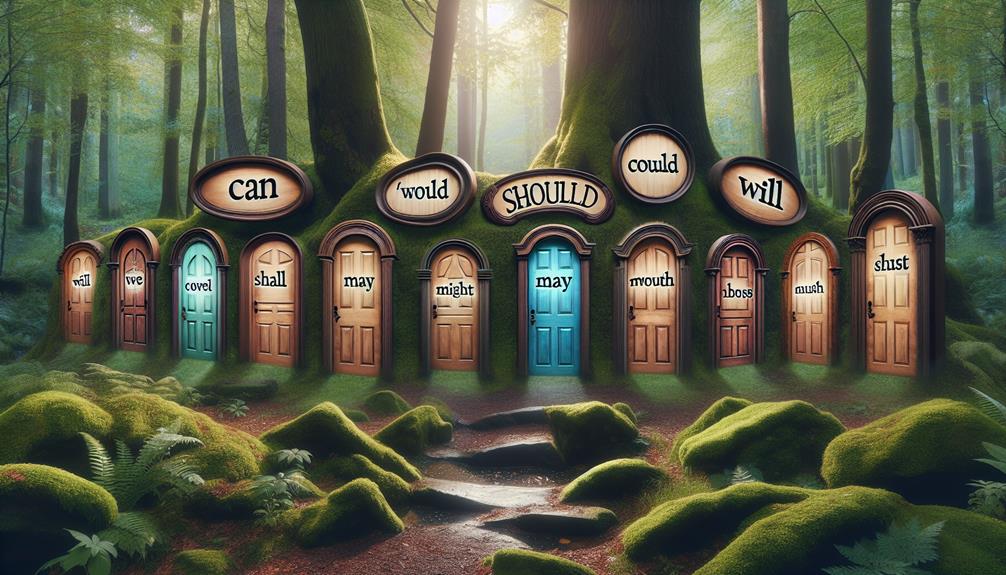The main function of modals is to modify the meaning of main verbs, helping me express ability, possibility, necessity, or permission. These handy verbs always need a main verb to complete their meanings and usually, the main verb follows in the infinitive form without 'to'. For instance, I can use 'can' to talk about capability, 'must' to indicate necessity, or 'may' to suggest permission. Each modal carries its unique nuance, making my speech more precise and my intentions clearer. There's quite a bit more to uncover about how these small words can make a big impact.
Table of Contents
Key Takeaways
- Modal verbs adjust the meaning of main verbs to express modes like ability, necessity, or permission.
- They convey different levels of possibility, probability, and obligation.
- Modals require a main verb in the infinitive form without 'to' to complete their meaning.
- Each modal verb uniquely affects the main verb to provide clarity and nuance in statements.
- Modal verbs are essential for polite and effective communication, ensuring clarity and respect in interactions.
Understanding Modal Verbs
Modal verbs, like 'can' and 'must', tweak the meaning of main verbs to express things like ability or obligation. Understanding how they operate in a sentence is key if you're aiming to master English nuances. These modals are crucial because they don't just stand alone; they always need a main verb to complete their meaning. And here's a tip: the main verb takes the infinitive form but drops the 'to'.
So, when I say, “I can play the guitar,” 'can' is the modal verb showing my ability, and 'play' is the main verb in its base form. It's pretty straightforward, right? Remember, you can't use these modals by themselves. Saying just “I can” hangs your listener in mid-air, waiting for what comes next.
Each modal verb serves a unique function. For instance, 'must' indicates a necessity or an obligation, pushing the urgency of the verb that follows. Getting these subtle differences right can really polish your speaking and writing skills. So, dive into them, use them, and watch how your English fluency transforms with these powerful little helpers called modal verbs.
Expressing Possibility and Probability
When we talk about what might happen, modal verbs like 'could,' 'may,' and 'might' are super handy. They help us paint pictures of potential outcomes or guess at how likely something is to occur.
Let's look at how these modals shape our understanding of likely scenarios and uncertain events.
Defining Likely Outcomes
Often, I use verbs like 'could,' 'may,' and 'might' to talk about what might happen or how likely something is. These modals are crucial tools for expressing possibility and probability. They let me spell out how certain or uncertain I'm about future events without stating it outright.
For instance, saying 'It may rain tomorrow' suggests a level of uncertainty and opens up room for different outcomes, which is different from a definitive 'It will rain tomorrow.' This sort of likelihood assessment is essential, especially when I need to convey nuanced thoughts.
Indicating Potential Scenarios
I can use verbs like 'could,' 'may,' and 'might' to paint a picture of what might happen in the future. These modal verbs are super handy when I need to express possibilities or uncertainties.
For instance, saying 'I might go to the concert' suggests there's a chance I'll attend, but it's not set in stone. These modals help me talk about the likelihood of events without committing to a definite yes or no.
This way of speaking is nuanced, allowing me to explore different outcomes without locking myself into one path. It's a flexible, subtle tool to communicate about things that could potentially happen, keeping options open and conversations dynamic.
Calculating Uncertain Events
In everyday conversations, we frequently use modal verbs like 'could,' 'may,' and 'might' to express the likelihood of events happening. These little words are super handy when I want to talk about what might occur without sounding too sure. For instance, saying 'It might rain tomorrow' or 'She may be late' lets me express possibilities without committing to a certainty.
These modals help us handle uncertainty, allowing us to speculate about the future or guess about the present. When we discuss probabilities, we're essentially assessing different levels of probability. It's like saying there's a chance something will happen, but it's not set in stone. This flexibility is crucial for navigating daily life and planning around uncertainties.
Indicating Ability and Permission
When we talk about modals, I find it fascinating how they help us express what we can do and what we're allowed to do.
For instance, saying 'I can swim' shows off my ability, while 'I may watch the movie' tells you what I'm permitted to do.
It's all about showing personal capabilities and setting the boundaries of what's okay and what's not.
Expressing Personal Capabilities
Modal verbs like 'can' and 'may' are key to expressing what we're able to do or allowed to do. When I say, "I can swim," I'm telling you about my ability. If I say, "I may go to the concert," I'm discussing the permission I've got, maybe from my parents or circumstances. These modal verbs are super handy in everyday talk because they help us specify what we're capable of or what we're permitted to do in clear terms.
| Modal Verb | Use | Example |
|---|---|---|
| Can | Express ability | I can cook Italian food. |
| May | Indicate permission | I may leave early today. |
| Can | Suggest possibility | I can possibly help with that. |
Understanding these gives us better control over our expressions!
Granting or Denying Access
While we've looked at how modals express personal capabilities, let's now explore how they're used to grant or deny access. Modal verbs like 'can' and 'may' are crucial in conveying permission.
For instance, saying 'You can enter' clearly grants access, while 'You may not leave' firmly denies it. These verbs aren't just about rules; they're about communication clarity.
Using 'could' and 'might' adds a layer, suggesting possibility rather than certainty. This subtle difference influences decisions, helping us determine when and how access is granted or denied.
Understanding these nuances allows me to express permissions and boundaries more effectively, ensuring my message is both understood and respected.
Conveying Necessity and Obligation
I need to understand that verbs like 'must' and 'have to' really emphasize what we can't skip out on doing. When I'm talking or writing, using these modal verbs helps me convey obligation and express necessity effectively. They're not just optional; they're crucial for pointing out duties or requirements that are non-negotiable.
For instance, saying 'You must submit the form by Friday' doesn't just suggest a deadline; it imposes one. It lets someone know that this action is essential, not just recommended. Likewise, 'I have to attend the meeting' indicates a personal obligation, something that falls squarely on my shoulders. This kind of language is powerful because it leaves little room for ambiguity or misunderstanding.
Understanding how these modal verbs work gives me the tools to communicate with precision and authority. They're not just about laying down the law; they're about ensuring that critical, essential actions are clearly outlined. That's why they're so important in legal, professional, and academic contexts, where the difference between what we must do and what we might do can have significant consequences. I've found that mastering their use is key to effective communication.
Making Requests and Offers
We often use modals like 'can' and 'would' to politely ask for help or make kind offers. When I'm in English-speaking settings, I've noticed how crucial it's to master these modals to come across as polite and considerate. For instance, saying 'Can you help me?' instead of 'Help me!' dramatically softens the request, making it more likely that I'll receive the help I need without offending the other person.
Similarly, when making offers, using modals effectively can make all the difference. 'Would you like some tea?' sounds much more inviting and less pushy than simply stating 'Have some tea.' It's all about giving the other person a choice, which is always appreciated.
Understanding how to use these modals for making requests and offers is vital. It's not just about communicating what I want or what I'm willing to give but also showing respect and thoughtfulness. This way, the interactions remain smooth and positive. Whether I'm asking for a favor or offering assistance, the right modal ensures that my intentions are clear and kindly presented, making English communication effective and courteous.
Giving Advice and Suggestions
Modal verbs like 'should' and 'ought to' are my go-to when giving advice or suggesting something. They're perfect for sharing recommendations in a way that doesn't come off as too pushy. For instance, if a friend's wondering whether to take a job offer, I might say, 'You should consider the benefits before deciding,' to nudge them without being overbearing.
Using modal verbs like 'should' can also show that I'm not just throwing out random suggestions; I'm basing them on sound reasoning or personal experience. It adds a layer of seriousness and thoughtfulness to my advice. For example, telling someone, 'You ought to check the reviews first,' implies that it's wise to gather more information before making a choice.
These modal verbs are handy because they help express the necessity or importance of an action subtly. They guide decisions and behavior effectively without dictating what exactly needs to be done. That's crucial because it respects the other person's ability to make their own choices. Ultimately, whether it's personal or professional advice, using modals ensures that my suggestions are taken seriously and considered thoughtfully.
Frequently Asked Questions
What Is the Main Point of Modals?
I'd say the main point of modals is to express different levels of necessity, possibility, or ability in a sentence. They're crucial for showing what's likely, allowed, or required in various situations.
What Is the Special Function of Modals?
I'd say the special function of modals is to express different moods like possibility, necessity, or permission. They're crucial in showing my attitude about what I'm saying and making my intentions clear.
What Is the Role of the Modal?
I'd say the role of a modal is to tweak a verb's meaning, showing likelihood, ability, or necessity. They're essential for expressing different attitudes like certainty, permission, or obligation in my sentences.
What Is the Function of Modals Ability?
I'd say the function of modals for ability is to show what someone is capable of doing. They help us express skills or lack thereof, like saying, "I can swim" or "I can't drive."
- What Is the Main Function of Modals? - April 21, 2024
- How Do Modals Work? - April 20, 2024
- Why Are Modals Called Modals? - April 20, 2024








